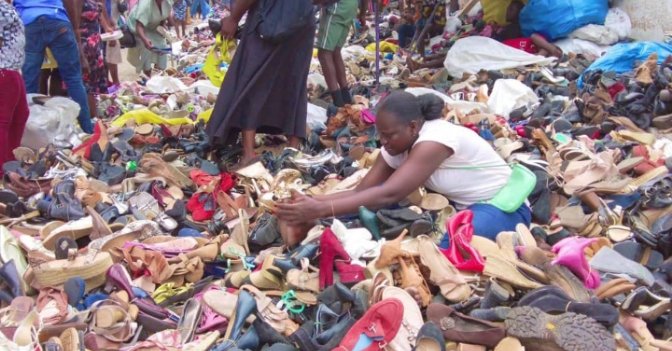Fashion Becomes Waste, Overconsumption left Ghana Drowning in Secondhand Clothes
I am a Ghanaian and every single week, huge bundles of secondhand clothes arrive in Ghana. The business men and women that resell it to Ghanaians are happy because they make their profits.
Most of the clothes come from Europe, America and other places. The market in Accra called Kantamanto receives tons of these clothes. It's a center for getting some of the cheapest, or let me polish it and say most affordable clothes since it's secondhand.
When you look at this at the surface, it looks like a gift, cheap clothes for people who cannot buy brand new ones. But the reality is that it has become a problem of overconsumption that many do not seem to notice.
Most of these clothes they bring from overseas are fast fashion. They are made quickly, sold quickly and thrown away quickly.
People in Western countries buy them in large numbers. Now this is not an article to push blame to any country, I would never disrespect an entire nation.
But when they do not want them anymore, the clothes are sent away as donations or cheap resales. Ghana becomes the final stop for this cycle of consumption. Of course it's not just Ghana, some nations have this problem too, but I use my country as an example.
The problem with this business model is that not all these clothes can be sold. Many are damaged, torn or out of style. The traders in Kantamanto open the bales with hope, but sometimes half of what is inside is almost useless. They end up losing money because they paid for clothes they cannot sell. So the question is what happens next? The unwanted clothes end up in piles of waste. They block gutters, fill landfills and even wash into the sea. It's a complete mess if you look at how this has contributed to filth in some not all parts of the country.
This is really not a small issue at all. Ghana receives about 225,000 tons of secondhand clothes every year. Just imagine mountains of fabric growing bigger and bigger each week, nonstop.
That is the side of overconsumption some people don't seem to see.
It's all fun and games until we see the real effect. Someone buys a cheap shirt in Europe, wears it two times, then it travels thousands of miles to Ghana. Right here, it becomes waste that some of the poor communities must deal with.
I'll reemphasize, it's not a talk against the western world, with due respect. Besides if the nation wanted to, we could just reject them, but I have a feeling that's going to create a problem internationally.
But there's good news because there's another side to the story. Some people in Ghana are finding creative ways to in a way fight back. A group called The Revival, takes old clothes and turns them into new things. They are able to make art, fashion and even building materials like bricks from the fabric waste. So recycling is saving the day for us at least.
This is proof that if we decide to, we absolutely can resist waste by reusing and rethinking what already exists.
Still, I'm asking myself the question why should Ghana carry the cost of overconsumption in richer countries? It decided to so I'm not blaming the richer countries.
The problem is that the fast fashion industry produces way too much and when people in the West are done with it, Africa carries on with it.
I believe this is a cycle that needs to change and it can only change if we change our ideologies and policies on consumption. The responsibility should not fall on Ghanaian traders, tailors and waste pickers alone, it should also fall on the manufacturers of fast fashion.
Do we really need to buy so much of this? What happens when we throw away clothes we no longer like? Who ends up carrying the burden? When does it stop? How long till we can come to an agreement that the world needs to be taken care of more and in proper management of what we consume, we can actually almost instantaneously create a better world for everyone.
For people in Ghana, the results of over consumption is very clear. They see it every day in Kantamanto. They walk past piles of fabric waste on the streets. They breathe the smoke when it is burned. They watch gutters flood because of blocked textile waste.
This needs to be tackled because everything has its limit until it becomes uncontrollably or irreversible. God I hope it doesn't come to that anyways.

Screenshot of state of kantamanto a couple of years ago before there was a huge fire outbreak

https://www.reddit.com/r/Anticonsumption/comments/1n5o2d2/fashion_becomes_waste_overconsumption_left_ghana/
This post has been shared on Reddit by @princessluv through the HivePosh initiative.